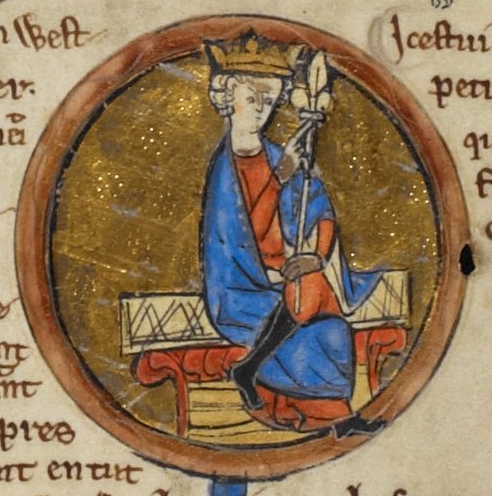By Kim Rendfeld
In 789, Ecgberht was a refugee in the Frankish court, driven from his home in Kent. His exile was another chapter in the long struggle between his kinsmen and Mercian King Offa.Twenty-seven years earlier, Kent suffered a succession crisis, with the death of Æthelberht II. Over the next few years, five men claimed to rule the kingdom or at least eastern or western half of it. One of them was King Ecgberht II, who at the time claimed the western half. This Ecgberht is not our hero but was perhaps a relative. Medieval aristocrats were fond of reusing names, especially to remind subjects, allies, and enemies of prior rulers.
The chaos about who exactly was in charge of Kent was an opportunity for Offa. He might have felt entitled to the kingdom next door because Kent had acknowledged his predecessor, Æthelbald, as overlord by 731. Whether that relationship lasted until Æthelbald’s murder in 757 is unknown.
By 765, Offa imposed himself as overlord of Kent, and apparently held on to the kingdom for several years.
 |
| 14th century image of Offa (public domain via Wikimedia Commons) |
The Kentish people apparently weren’t happy with Mercian rule. In 776, Ecgberht II led soldiers to drive Offa out. They fought at Otford, and Kent likely won its independence, if we are to believe circumstantial evidence like coins with Ecgberht II’s name and charters with his name but not Offa’s. This time Ecgberht II ruled all of Kent.
We know Ecgberht II flourished between 765 and 779, but don’t know how his reign ended. King Ealhmund, our hero’s father, might have succeeded him. Evidence is scant. One piece is that his name appears on charters. Ealhmund’s relationship between Ecgberht II, assuming there is one, is unknown. Ealhmund did name his son after the warrior who triumphed over a foreign invader.
But Offa was not one to sit quietly. By 785, he reimposed his authority on Kent, issuing charters in his name without a reference to a Kentish king. Ealhmund’s fate is a mystery. Was he killed? Driven out?
Ecgberht, Ealhmund’s son, was still around. Considering that he lived until 839, 50 years after he went into exile, he might have been an adolescent when his father lost Kent. Offa likely saw Ecgberht as a threat, as he likely perceived anyone with a claim to the throne.
In 789, Offa enlisted the aid of his new son-in-law, Beorhtric, to help solve his problem—perhaps it was one of the reasons the Mercian king and his wife arranged of his daughter Eadburh to the king of Wessex. Until this time, Beorhtric probably had no quarrel with Ecgberht and no concern about Kent. But he did have this new alliance and might have felt obligated to fulfill it.
Driven from home, Ecgberht found refuge in Charlemagne’s court or in Francia. Either way, he would have had the permission of the Frankish king to be there, much to Offa’s aggravation. Ecgberht might have met fellow exiles during his time in Francia, including Eadberht Præn. Sharing the name of prior Kentish kings, Eadberht likely had been tonsured against his will—a common way to deny rivals their inheritance to the crown.
Seven years later, Mercian rule in Kent was again challenged. Offa died in July 796, and his son, Ecgfrith, succeeded him. Although Ecgfrith had be crowned co-ruler, he didn’t seem as strong as his father. Some aristocrats in Kent might have seen opportunity.
That same year, Eadberht Præn decided to leave the priesthood and seize power. He reigned for two years, having coins minted in his name and getting rid of a troublesome archbishop. In the meantime, Ecgfrith died, and his successor, Cenwulf, was able to stabilize Mercia then try to regain Kent.
Eadberht Præn was captured in 798 and taken in chains to Mercia. Things turned out horribly for him. Because he had been ordained, he could not be killed, but he suffered what some might see as a worse fate. Be warned: it is gruesome. His captors blinded him, chopped off his hands, and sent him to Winchcombe, an abbey Cenwulf had recently founded. Thus crippled, Eadberht Præn would never be able to rule again.
 |
| 13th century image of Ecgberht (public domain via Wikimedia Commons) |
In 802, Ecgberht decided to claim power, but he didn’t go for Kent. Instead he invaded Wessex. It’s uncertain why he decided on Wessex. Perhaps it was the easier target, and Ecgberht had not forgotten how Beorhtric had helped Offa steal what was rightfully his. The two likely met on the battlefield at Wiltshire. Beorhtric died, and Ecgberht seized the crown.
He didn’t stop at Wessex. During his 37-year reign, Ecgberht would extend his rule to include Surrey, Essex, Sussex, and Kent.
Sources
Oxford Dictionary of National Biography, including
“Offa” by S.E. Kelly
“Eadberht Præn” by S.E. Kelly
“Ecgberht” by Heather Edwards
“Æthelberht II” by S.E. Kelly
~~~~~~~~~~
Kim has written two other books set in 8th century Francia. In The Cross and the Dragon, a Frankish noblewoman must contend with a jilted suitor and the fear of losing her husband (available on Amazon). In The Ashes of Heaven's Pillar, a Saxon peasant will fight for her children after losing everything else (available on Amazon). Kim's short story “Betrothed to the Red Dragon,” about Guinevere’s decision to marry Arthur, is set in early medieval Britain and available on Amazon.
Connect with Kim at on her website kimrendfeld.com, her blog, Outtakes of a Historical Novelist at kimrendfeld.wordpress.com, on Facebook at facebook.com/authorkimrendfeld, or follow her on Twitter at @kimrendfeld.



No comments:
Post a Comment
Note: Only a member of this blog may post a comment.